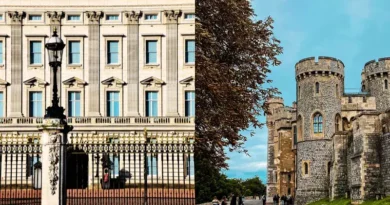Do Staff Live at Windsor Castle? Know Everything
Yes, staff do live at Windsor Castle. Approximately 150 staff members reside on the premises to help maintain the castle and support the royal family. These staff members have a variety of roles, including fendersmiths, who maintain the castle’s many fireplaces, and horologists, who care for its numerous clocks. Other positions include footmen, housemaids, and valets.
Living at Windsor Castle comes with certain benefits, such as having their own rooms maintained by cleaning staff. This arrangement has historically been quite comprehensive, providing for most of their daily needs, which made the job quite appealing despite relatively modest pay.
Key Takeaways
| Section | Key Takeaways |
|---|---|
| Current Staff Residency | Approximately 150 staff live at Windsor Castle, performing housekeeping, maintenance, and security roles. |
| Living Arrangements | Staff accommodations are functional, with amenities like housekeeping, laundry services, and communal meals. Historical improvements have enhanced living conditions. |
| Daily Life of Live-In Staff | Structured routines, formal interactions with the royal family, and camaraderie among staff members. |
| Historical Context | Staff residency dates back centuries, evolving from basic accommodations to modern living quarters. |
| Job Roles and Responsibilities | Diverse roles include housemaids, butlers, chefs, fendersmiths, and security personnel, each with specific duties and specialized training. |
| Benefits and Challenges | Perks include living in a historic environment, job security, and participation in royal events. Challenges involve long hours, high standards, and limited privacy. |
| Staff Recruitment and Retention | Recruitment involves thorough interviews and background checks. Efforts to retain staff include professional development and a supportive work environment. |
| Personal Stories and Testimonials | Staff share pride in contributing to a historic residence. Personal anecdotes highlight both the rewards and challenges of their roles. |
| Impact of Royal Events and Activities | Royal events increase workload and require meticulous preparation. Staff roles are crucial in both daily activities and major events. |
Let’s discuss in detail:
Windsor Castle, a majestic and historical residence, is more than just a symbol of British royalty. It is a home and workplace for numerous staff members who ensure its operations run smoothly.
This article delves into the intricacies of staff residency at Windsor Castle, exploring their living arrangements, daily routines, historical context, job roles, benefits, challenges, recruitment, retention, personal stories, and the impact of royal events on their lives.
Current Staff Residency at Windsor Castle

Number of Staff Living at the Castle:
Approximately 150 staff members reside within Windsor Castle’s grounds. This number includes a diverse range of personnel, from housekeeping and maintenance staff to security and administrative employees.
Living within the castle allows these staff members to be readily available for their duties, ensuring that the royal household functions seamlessly.
Types of Roles and Responsibilities:
The roles of live-in staff are varied and essential to the castle’s operations. Key roles include:
- Household Staff: Responsible for cleaning, maintaining rooms, and attending to the royal family’s and guests’ needs.
- Maintenance Staff: Includes fendersmiths who maintain fireplaces and horologists who care for clocks.
- Culinary Staff: Prepare meals for the royal family and events.
- Security Personnel: Ensure the safety of the castle and its inhabitants.
- Gardening and Groundskeeping Staff: Maintain the castle’s extensive gardens and outdoor areas.
- Administrative Staff: Handle logistical and administrative tasks, supporting the daily operations.
Living Arrangements

Description of Staff Accommodations:
Staff accommodations at Windsor Castle are functional and reflect the residence’s historical nature. Typically, staff members live in small apartments or individual rooms within the castle or its immediate grounds. These living spaces are designed to be practical, offering necessary amenities while preserving the historical ambience.
Amenities and Services Provided to Staff:
Staff members benefit from several amenities, including:
- Housekeeping Services: Regular cleaning and maintenance of their living quarters.
- Laundry Facilities: Access to on-site laundry services.
- Meals: Communal dining areas where meals are provided, ensuring staff can access nutritious food without cooking.
- Recreational Facilities: In some cases, staff may access recreational amenities within the castle grounds, fostering a sense of community and well-being.
Historical Comparison of Staff Living Conditions:
Historically, staff living conditions at Windsor Castle have evolved significantly. In earlier centuries, staff often lived in cramped, basic accommodations within the castle walls.
Over time, improvements have been made to enhance the quality of life for live-in staff, with better living quarters, modern amenities, and a more structured approach to their well-being.
Daily Life of Live-In Staff

Routine and Work Schedules:
The daily routines of live-in staff are structured and demanding. Typically, their workday begins early, with housemaids starting cleaning duties and maintenance staff performing routine checks and repairs. Culinary staff begin meal preparations to cater to the royal family’s and guests’ various dining needs. Security personnel maintain vigilance throughout the day and night.
Interaction with the Royal Family and Other Staff:
Interaction with the royal family is formal and professional. Staff members must maintain a respectful distance, ensuring discretion and professionalism. Interactions among staff members are more relaxed, fostering camaraderie and mutual support. Shared experiences in communal spaces and during meals help build strong bonds within the staff community.
Unique Aspects of Working in a Royal Residence:
Working at Windsor Castle offers unique experiences and challenges. Staff members participate in historic events and royal ceremonies, gaining a front-row seat to significant moments. The prestige of working in such a renowned residence is balanced by the high standards and expectations they must meet daily.
Historical Context

Evolution of Staff Residency at Windsor Castle:
Staff residency at Windsor Castle dates back centuries, with the castle always requiring a dedicated team to maintain its operations. In medieval times, the staff included a variety of roles, from cooks and grooms to craftsmen and musicians.
Over the centuries, the number and variety of staff have grown, reflecting the increasing complexity of running a royal residence.
Changes in Living Conditions Over the Centuries:
Living conditions for staff have improved dramatically over time. In the Victorian era, staff accommodations began to see significant upgrades, with dedicated living quarters for different categories of staff. Modern plumbing, heating, and electrical systems were introduced in the 20th century, further enhancing live-in staff’s comfort and quality of life.
Notable Historical Anecdotes:
Throughout its history, Windsor Castle has been home to many interesting and specialized roles. For instance, the fendersmiths, responsible for maintaining the castle’s fireplaces, have been a critical part of the staff for generations.
Another fascinating role is that of the horologist, who ensures that the castle’s extensive collection of timepieces remains in perfect working order.
Job Roles and Responsibilities

Detailed Description of Various Job Roles:
- Housemaids: Perform cleaning and maintenance of rooms, ensuring they are always in impeccable condition.
- Butlers and Valets: Attend to the royal family’s and guests’ personal needs, manage wardrobes and assist with dressing.
- Chefs and Kitchen Assistants: Prepare meals for the royal family and events, ensuring high culinary standards.
- Fendersmiths and Horologists: Maintain the fireplaces and timepieces, preserving the castle’s historical functionality.
- Security Personnel: Ensure the castle’s and its residents‘ safety and security.
- Gardening and Groundskeeping Staff: Maintain the castle’s gardens and grounds, keeping them pristine.
Specific Duties and Responsibilities:
Each role carries specific duties tailored to the castle’s and its residents’ needs. Housemaids, for example, follow daily cleaning routines and prepare rooms for guests, while butlers manage personal services and event preparations. Maintenance staff conduct regular inspections and repairs to preserve the castle’s infrastructure.
Training and Qualifications Required:
Many roles at Windsor Castle require specialized training. Housemaids and butlers undergo rigorous training programs to meet the high standards expected. Chefs often have formal culinary training, and maintenance staff, such as fendersmiths and horologists, possess expertise in their respective fields. Security personnel have backgrounds in security services and receive additional training specific to royal protocols.
Benefits and Challenges

Perks of Living and Working at Windsor Castle:
- Historic Environment: Working in a historic castle creates pride and a connection to British heritage.
- Job Security and Benefits: Employment often comes with various benefits, including accommodation and healthcare.
- Community and Camaraderie: The close-knit community fosters strong bonds among staff members.
- Exclusive Events: Staff participate in and support royal events, experiencing significant historical moments.
Challenges Faced by Live-In Staff:
- Long Hours and High Standards: The work can be demanding, with long hours and high expectations.
- Privacy and Personal Space: Living on-site means limited personal privacy and space.
- Professional Distance: Maintaining a professional demeanour and distance from the royal family and guests can be challenging.
Comparison to Other Royal Residences:
Windsor Castle offers a different living and working environment than royal residences like Buckingham Palace. While Buckingham Palace is located in the bustling city of London, Windsor Castle provides a more tranquil setting.
However, staff’s expectations and challenges are similar across all royal residences.
Staff Recruitment and Retention

Recruitment Process for Live-In Positions:
The recruitment process is thorough, involving multiple interviews and background checks. Candidates must demonstrate the necessary skills and a deep understanding of the expectations and responsibilities associated with working at a royal residence. Job postings are advertised on official royal websites and relevant employment platforms.
Staff Turnover Rates:
Historically, Windsor Castle has experienced relatively low turnover rates due to job security and benefits. However, the demanding nature of the work can lead to burnout, necessitating regular recruitment to fill vacancies.
The castle’s reputation as a prestigious workplace attracts many applicants, ensuring a steady influx of new talent.
Efforts to Retain Staff and Improve Job Satisfaction:
Efforts to retain staff include offering professional development opportunities, regular feedback sessions, and a supportive work environment. Providing clear career progression paths helps retain skilled employees. Enhancing job satisfaction is achieved through recognizing and rewarding hard work, fostering a sense of community, and ensuring staff feel valued and respected.
Impact of Royal Events and Activities

How Royal Events Affect the Staff:
Royal events such as state banquets, weddings, and official ceremonies significantly increase the staff’s workload. These events require detailed preparation and flawless execution.
Staff members often work extended hours during these events to ensure everything runs smoothly, from setting up venues to catering and security arrangements.
Preparations and Responsibilities During Major Events:
Preparations for major events involve detailed planning and coordination among various departments. Housekeeping staff ensure that all areas are impeccably clean, while culinary staff prepare elaborate menus.
Security personnel enhance their vigilance to ensure the safety of the royal family and guests. Administrative staff handle the logistics and guest coordination, ensuring every detail is accounted for.
Staff Roles in Day-to-Day Royal Activities:
In addition to major events, staff play a crucial role in the royal family’s day-to-day activities. This includes managing daily routines, preparing meals, maintaining the estate, and providing personal services.
The seamless integration of these activities is essential to maintaining Windsor Castle’s smooth operation as both a residence and a historical landmark.
Conclusion
Staff living at Windsor Castle are essential in maintaining the castle’s operations and supporting the royal family. Their dedication and hard work ensure this historic site continues functioning smoothly and remains a cherished part of British heritage.
While the job comes with its own challenges, the unique benefits and experiences make it a rewarding endeavour for those who take on the responsibility.
FAQ
Do staff members live at Windsor Castle?
Yes, some staff members live at Windsor Castle. Roles such as housekeepers, chefs, security personnel, and other essential employees are often provided accommodation on-site. Living at the castle ensures staff can efficiently support the Royal Family, especially during events and ceremonies.
What type of accommodation do staff at Windsor Castle receive?
Staff accommodations vary from shared apartments to single rooms within the castle grounds or nearby estate properties. These spaces are designed to be practical and have basic furnishings. Some accommodations include en-suite facilities, while others share communal bathrooms and kitchens.
Are staff required to live at Windsor Castle?
While not all staff are required to live on-site, certain positions—such as security personnel and senior housekeeping staff—mandate living at the castle due to the nature of their duties. Accommodation may be optional or not provided at all for other roles.
Do staff pay rent to live at Windsor Castle?
Yes, on-site staff typically pay subsidised rent, often deducted from their salaries. The rent is significantly lower than market rates and varies depending on the size and type of accommodation provided. This arrangement is part of the overall employment package.
What facilities do staff at Windsor Castle have access to?
Staff can access facilities such as a dedicated dining hall, laundry services, recreational spaces, and sometimes private or shared gardens. Staff support services, including counselling and career development resources, help employees balance their work and personal lives.
How many staff members live at Windsor Castle?
Around 150 staff members live on-site at Windsor Castle at any given time. This includes essential personnel to maintain the castle’s operations, ensure security, and support royal events. The number can increase during large-scale events.
Do Windsor Castle staff work directly for the Royal Family?
Yes, most staff members living at Windsor Castle are employed by the Royal Household, which provides services and support to the British monarchy. Their duties directly contribute to the castle’s smooth functioning as a royal residence and working estate.
Can staff bring family members to live with them at Windsor Castle?
No, accommodations at Windsor Castle are strictly allocated to the staff members and unsuitable for families or dependents. The living quarters are designed for single occupancy or, in rare cases, shared by staff members of the same role.
Do staff living at Windsor Castle have privacy?
Staff have private living quarters but must adhere to strict confidentiality rules and protocols due to the sensitive nature of their work. Social interactions within the castle are professional, and privacy is respected as long as it does not conflict with security or job responsibilities.
Are meals provided for staff living at Windsor Castle?
Yes, staff can access on-site dining facilities where free meals are provided at a heavily subsidised rate. The castle’s catering team prepares the food and includes various options to suit different dietary needs.
Can staff leave Windsor Castle during their free time?
Yes, staff are free to leave the castle during their off-hours, but they must follow strict security procedures when entering or exiting. They are also expected to inform their supervisors if they plan to be away for an extended period.
What security measures are in place for staff living at Windsor Castle?
All staff undergo extensive background checks before being hired. On-site, they are subject to security protocols, including ID checks, restricted access to certain areas, and CCTV monitoring. The castle’s security team works 24/7 to ensure the safety of both staff and residents.
Do staff receive training before living at Windsor Castle?
Yes, all staff receive comprehensive training tailored to their roles, including operational procedures, security awareness, and protocols for interacting with members of the Royal Family or the public. Additional training is provided for emergencies, such as fire drills and evacuation procedures.
Can staff invite guests to Windsor Castle?
Guests are generally not permitted to stay in the castle’s private staff accommodations or restricted areas. Supervisors must approve any exceptions, such as family visits, in advance, and they are subject to strict security protocols.
Do staff at Windsor Castle have fixed working hours?
Working hours depend on the role. For example, security personnel may work in shifts around the clock, while housekeeping staff may have more regular daytime hours. During major events or royal engagements, staff often work extended hours to meet additional demands.
Are there career progression opportunities for staff at Windsor Castle?
Yes, the Royal Household offers career development programmes, mentoring, and opportunities for internal promotion. Based on performance and experience, staff can move into senior roles or transfer to other royal residences, such as Buckingham Palace or Sandringham.
Is Windsor Castle staff accommodation modern?
Staff accommodations blend historical elements with modern amenities. While not luxurious, they are well-maintained and include essentials like heating, Wi-Fi, and basic furnishings. The accommodations reflect the functional nature of the castle’s operations.
Do staff living at Windsor Castle interact with the Royal Family?
Some staff, such as senior chefs, butlers, or personal aides, may occasionally interact with the Royal Family as part of their duties. However, most staff members work behind the scenes and have limited direct contact.
Can staff use their own vehicles at Windsor Castle?
Parking is limited and typically reserved for senior staff or those whose roles require vehicle use. Many employees rely on public transport, and Windsor’s central location makes it easily accessible. For on-site staff, walking within the grounds is the norm.
How do you apply for a job with accommodation at Windsor Castle?
Job vacancies are listed on the official Royal Household website. Positions offering accommodation are clearly stated in the job descriptions. Applications typically require a detailed CV, references, and an interview process, which may include security checks.
References and Sources
- Express.co.uk: Insights into the historical and current living conditions of staff at Windsor Castle.
- Ruggedthuglife.com: Information on the number of staff living and working at Windsor Castle.
- Mentalfloss.com: Detailed descriptions of the various roles and responsibilities of staff members.
- Hello Magazine: Accounts of life at Windsor Castle, including personal stories and historical context.
- Reader’s Digest: Personal testimonials and the impact of working at Windsor Castle on staff members’ lives.









